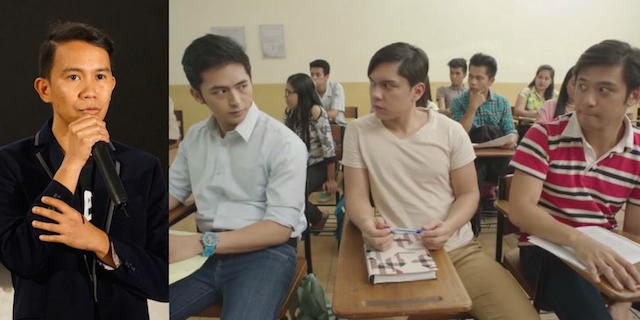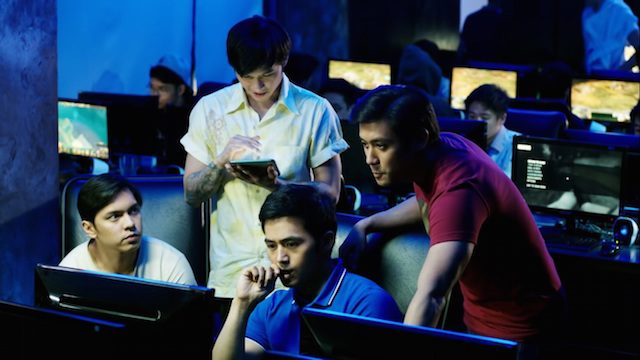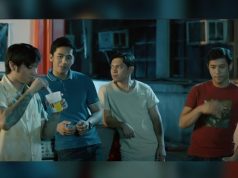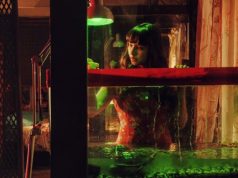It might have been easier to make a barkada movie that focuses on lighter yet universally relevant themes, such as the pursuit of young love and the rejection that comes with it; minor conflict with your best friend; teenage rivalry, or the physical insecurities that come with growing up.
And yet, filmmaker Kip Oebanda chose to make his film different from other youth-oriented films out there.
Oebanda’s “Bar Boys” tackles some of the above-mentioned themes but takes its cue from the lives of law school students. However, it doesn’t dwell on every article, code and case in a law book. It veers away from the seriousness of the courtroom and prefers to entertain viewers with its candid and accurate depiction of the triumphs, challenges and misadventures one encounters in law school.
Through the lives of four young men — Torran, Chris, Erik and Josh — “Bar Boys” answers quite a few questions, from what it takes to get into law school (and what you don’t need to get in), to what you need to stay and eventually graduate.
It tells us, in the most light-hearted and often comedic ways, what an aspiring lawyer needs to go through from the time he passes the qualifying entrance test to the time he needs to take the board exam. There are details to take note of and lessons to learn.
Rocco Nacino plays the slick and sometimes overconfident Torran Garcia, the alpha-male with a healthy middle-class background whose only purpose is to make it to graduation day. He belongs to a big, warm Filipino family, with parents that invite neighbors to celebrate the achievements of their offspring.
Torran has enough smarts to get into law school, unlike Josh (Kean Cipriano), who had to pursue a different path. He doesn’t have to measure up to the high expectations of his father in the same way the privileged Chris (Enzo Pineda) does, or loan money to pay for tuition, like Erik (Carlo Aquino).
Everything seems to fall into place for Torran. Not only is he fortunate enough to pursue his dream of becoming a lawyer without complications; he’s so lucky he gets the chance to share an intimate encounter with one of the prettiest in class. Torran feels a moral dilemma only when he witnesses one of his fraternity brothers abuse a neophyte, and is torn between reporting the offense to school authorities or preserving his seat in the so-called brotherhood.
This is where we are given a glimpse into school fraternities and the sensitive issue of hazing is tackled. The only other form of conflict that worries Torran is when rifts between Erik and Chris threaten to dissolve the barkada.

Through Chris, we are told that grooming oneself to become a lawyer entails enormous sacrifices even if you’re born with a golden spoon inside your mouth. Chris has the option to instead go to an Ivy League university in the United States, but opts to take up law in the Philippines partly because he wants to be in close proximity with the girlfriend (Ana Luna) his father (Pontri Bernardo) doesn’t know about.
Erik’s plight reminds us that poverty should not prevent us from pursuing our dreams and that there are people who are willing to help and inspire us along the way, but in the end, success or failure awaits depending on our level of persistence and the quality of our work.
The scenes inside the classroom are funny even if they involve terror professors like Atty. Fernandez (Odette Khan) and even funnier with the presence of a young gay professor who fancies one of his students. Although entertaining to watch, the classroom episodes deliver a common serious message: you do not — you cannot — slack off in law school if you want to make it.
Most of the scenes are light, alright, but there are also a few that stand out for being heartbreaking and sincere, yet not overly dramatic. Music was used in just the right doses. In one scene that involves Erik and his father, who is an ageing security guard, dialogue is kept to a bare minimum but music more than makes up for its absence, resulting in beautiful, poignant portrayal.
Even if it has to tell the stories of essentially four different people, loose ends are firmly knotted together. Aside from being a movie on the lives of law students and an offbeat barkada film, “Bar Boys” is also a reflection of our society; one that mirrors the lives of people from different social standings as well as the good and bad values that Filipinos deal with separately at one point or the other.
It appeals to law students like Torran and his friends, but it also appeals to the rest of us because each of us is a student of life, continuously learning and trying to make it through.
While it remains on the safe side and is apolitical and refuses to make use of cases that might be startlingly relevant to the current events in the country, the film is sincere in everything else it does, delivering its finer points with sparkling clarity. You leave the cinema knowing that you’ve watched a pretty good feel-good movie.
“Bar Boys” is one of 12 films being shown in cinemas until today as part of the Pista ng Pelikulang Pilipino.










